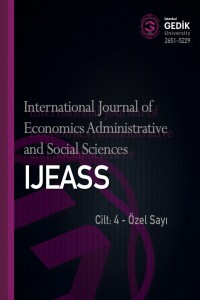Öz
Bu makale özellikle kent planlaması ve araştırmaları içeren disiplinlerde kullanılan yöntemlerden bir tanesi olan zihinsel haritalama (mental mapping) yönteminin farklı ders yapılarında ortaya koyduğu yararı tartışmayı amaçlar. Bir saha tekniği olan bu yöntemi özellikle kent sosyolojisi ve göç sosyolojisi üzerine derslerde farklı kurgularla uyguladığımda dersteki teorik aktarımların daha kolay yapıldığını deneyimledim. Bunun sebebinin bu tekniğin teorik tartışmaların her öğrencinin kendine has, bireysel deneyimine ulaşmasını sağlamasına bağlıyorum. Grup çalışmalarında kullanıldığında kente dair pek çok meselenin tartışılması görselleştirilmemiş tartışmalara kıyasla daha verimli olmaktadır. Benzer bir uygulama göç sosyolojisi için yapıldığında da insan hareketliliğinin mekândaki dağılımını deneyim üzerinden tartışabilmek aynı şekilde dersin akışı kolaylaşmaktadır. Bu teknik sayesinde öğrencilerin aktif katılımı onları edilgen bilgi alıcılarından kendi deneyimleriyle dersi yapılandıran öznelere dönüştürür. Örneklenecek çalışmalar aynı zamanda öz-düşünümsel/yüzleşmeci yaklaşımın bu derslerin hem tasarım hem de aktardığı meselelerin etraflıca tartışılmasındaki etkisi ile ele alınacaktır.
Anahtar Kelimeler
zihinsel haritalama kent sosyolojisi göç sosyolojisi öznellik-nesnellik tartışmaları öz düşünümsellik/yüzleşmeci yaklaşım
Kaynakça
- Bödeker, M. (2018).Walking and walkability in pre-set and self-defined neighborhoods: A mental mapping study in older adults. International Journal of Environmental Research and Public Health 15, no.7: 1363, 1-12.
- Castles, S. ve Miller, M.J. (1998). The age of migration: International population movements in the modern world. London: Mcmillan.
- Certeau, M. de. (2009). Gündelik hayatın keşfi II. Ankara: Dost.
- Habermas, J. (2004). Kamusal alan. Meral Özbek (ed) Kamusal alan içinde (ss. 95-102). İstanbul: Hil Yayın.
- Harvey, D. (2014) .Kentsel mekân mücadeleleri neden önemlidir?. Mekân meselesi içinde. İstanbul:Tekin.
- Harvey, D. (2008). The right to the city. New Left Review, 53, 23-40.
- Huyssen, A. (October 01, 1997). The voids of Berlin. Critical Inquiry, 24, 1, 57-81.
- Kümbetoğlu, B. (2005). Sosyolojide ve antropolojide niteliksel yöntem ve araştırma. İstanbul: Bağlam.
- Lee, E. S. (1966) A theory of migration. Demography, 3(1), 47-57.
- Lefebvre, H. (1991). The production of space. Oxford, OX, UK; Cambridge, Mass., USA: Blackwell
- Lynch, K. (1960). The image of the city. Cambridge, Massachusetts: MIT Press.
- Maton, K. (1 Şubat 2003). Pierre Bourdieu and the epistemic conditions of social scientific knowledge. Space and Culture, 6(1), 52-65.
- Massey, D. S.,ve diğerleri (1993). Theories of international migration: A review and appraisal. Population and Development Review, 19(3), 431-466.
- Pateman, C. (1988). The fraternal social contract. Keane, J. (ed) Civil society and the state: New European perspectives içinde (101-127). London: Verso.
- Soja, E. (January 01, 1980). The socio-spatial dialectic. Annals of the Association of American Geographers, 70, 2, 207-225.
- Stouffer, S.A. (1940). Intervening opportunities: A theory relating mobility and distance. American Sociological Review, 5(6), 845-867.
- Wacquant, L. J. D. (1992). Toward a social praxeology: The structure and logic of Bourdieu’sso- ciology. Bourdieu. P ve Wacquant, L. J. D. (Ed.) An invitation to reflexive sociology içinde. Cam- bridge: PolityPress.
Öz
This article aims to discuss the productive feature of the mental mapping technique, which is mainly used in disciplines related to urban planning and research, in different course structures. My experience on the use of variations of this technique in courses is the ease of transmitting the theoretical narrations in courses to students. I believe this outcome is resulted since this technique enables the reach of the theoretical discussions to the individual, authentic experience of each student. When used in group work the discussions related to urban area become more prolific in comparison with the non-visualized discussions. A similar application in the course for Sociology of Migration eases the flow of the course because the spatial distribution of human mobility is discussed over personal experience. As a result of this technique the active participation of students transform them from passive information receivers to agents who shape the course by their experiences. The cases to be presented here will be evaluated together with the effect of self-reflexive approach on the design and the detailed discussions on the course topics.
Anahtar Kelimeler
mental mapping urban sociology sociology of migration self-reflexivity objectivity-subjectivity discussions
Kaynakça
- Bödeker, M. (2018).Walking and walkability in pre-set and self-defined neighborhoods: A mental mapping study in older adults. International Journal of Environmental Research and Public Health 15, no.7: 1363, 1-12.
- Castles, S. ve Miller, M.J. (1998). The age of migration: International population movements in the modern world. London: Mcmillan.
- Certeau, M. de. (2009). Gündelik hayatın keşfi II. Ankara: Dost.
- Habermas, J. (2004). Kamusal alan. Meral Özbek (ed) Kamusal alan içinde (ss. 95-102). İstanbul: Hil Yayın.
- Harvey, D. (2014) .Kentsel mekân mücadeleleri neden önemlidir?. Mekân meselesi içinde. İstanbul:Tekin.
- Harvey, D. (2008). The right to the city. New Left Review, 53, 23-40.
- Huyssen, A. (October 01, 1997). The voids of Berlin. Critical Inquiry, 24, 1, 57-81.
- Kümbetoğlu, B. (2005). Sosyolojide ve antropolojide niteliksel yöntem ve araştırma. İstanbul: Bağlam.
- Lee, E. S. (1966) A theory of migration. Demography, 3(1), 47-57.
- Lefebvre, H. (1991). The production of space. Oxford, OX, UK; Cambridge, Mass., USA: Blackwell
- Lynch, K. (1960). The image of the city. Cambridge, Massachusetts: MIT Press.
- Maton, K. (1 Şubat 2003). Pierre Bourdieu and the epistemic conditions of social scientific knowledge. Space and Culture, 6(1), 52-65.
- Massey, D. S.,ve diğerleri (1993). Theories of international migration: A review and appraisal. Population and Development Review, 19(3), 431-466.
- Pateman, C. (1988). The fraternal social contract. Keane, J. (ed) Civil society and the state: New European perspectives içinde (101-127). London: Verso.
- Soja, E. (January 01, 1980). The socio-spatial dialectic. Annals of the Association of American Geographers, 70, 2, 207-225.
- Stouffer, S.A. (1940). Intervening opportunities: A theory relating mobility and distance. American Sociological Review, 5(6), 845-867.
- Wacquant, L. J. D. (1992). Toward a social praxeology: The structure and logic of Bourdieu’sso- ciology. Bourdieu. P ve Wacquant, L. J. D. (Ed.) An invitation to reflexive sociology içinde. Cam- bridge: PolityPress.
Ayrıntılar
| Birincil Dil | Türkçe |
|---|---|
| Bölüm | Makaleler |
| Yazarlar | |
| Yayımlanma Tarihi | 29 Ocak 2021 |
| Yayımlandığı Sayı | Yıl 2021Cilt: 4 |


